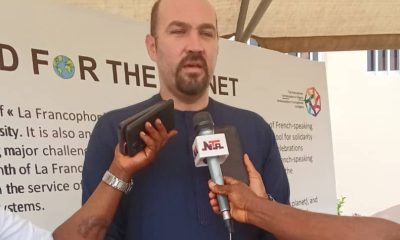Economy
Zenith Bank Customers Lament Maintenance Delays, Online Service Disruptions

Customers of Zenith Bank have taken to social media platforms to express their frustration over difficulties with online banking transactions.
They reported challenges in making payments and using various payment features on X on Tuesday, following a notification from the bank on Saturday that it would undergo maintenance from September 29 to October 1.
In a statement shared by Zenith Bank on X on Saturday, it said the routine maintenance would commence on September 29 and end on October 1, from 12:01 AM to 5:00 AM.
The statement titled “Notice of Routine Maintenance” read, “Please be informed that we are currently undertaking routine maintenance of our Information Technology Infrastructure to enable us to significantly improve the quality of service rendered to you.
“On Tuesday, October 1, 2024, our Mobile Banking App, USSD Service, Internet Banking, and Corporate Internet Banking platforms will be unavailable between the hours of 12:01 AM and 2:30 PM WAT.
“We solicit your understanding and offer our assurances that measures are in place to minimise any service interruptions during the exercise.”
However, customers noted that despite the prior notification, the bank did not begin the announced maintenance until Tuesday.
Speaking with our correspondent, Olaniyi Oludare expressed disappointment that he expected the maintenance to commence on Monday, which did not happen.
Oludare lamented that he was unable to withdraw money for food and transportation to his workplace, forcing him to borrow money from colleagues.
“It is frustrating. I haven’t eaten all day because I wasn’t able to withdraw money today (Tuesday). Zenith said they would be undergoing maintenance on Saturday through a pop-up message on the bank app, but they didn’t start until this morning,” he said.
Also, another Zenith customer on X, Adeleye A. P., tweeting as #deji4ever, criticised the bank for not scheduling maintenance during the night, particularly at the end of the month when employees are expecting their salaries.
#deji4ever wrote, “The worst bank award should be given to Zenith. Why deny customers transfer privileges to other banks on the last day of the month? It’s a bad business strategy to ensure money doesn’t leave its coffers.”
Another user, Dave Oriss, tweeting as #orissonline, added, “#ZenithBank, you people should keep frustrating your customers. Some have emergencies, and you are busy shifting the time for maintenance.”
In response to the outcry on Tuesday, Zenith Bank released another notification on X, stating that it was undergoing routine maintenance of its information technology infrastructure.
It stated that the maintenance was scheduled to take place from 12:01 AM to 2:30 PM on Tuesday.
The statement reads, “Please be informed that we are currently undertaking routine maintenance of our Information Technology Infrastructure to significantly improve the quality of service rendered to you.
“On Tuesday, October 1, 2024, our Mobile Banking App, USSD Service, Internet Banking, and Corporate Internet Banking platforms will be unavailable between the hours of 12:01 AM and 2:30 PM WAT.
“We solicit your understanding and assure you that measures are in place to minimise any service interruptions during this exercise.”
Reacting to the statement, X users reiterated that bank maintenance should ideally occur during the night rather than during daytime hours when customers are actively using banking services.
A user, Dave, tweeting as #orissonline, stated, “You people should keep frustrating your customers. Some have emergencies, and you are busy shifting the time for maintenance.”
Another user, Ken, tweeting as #KennethNnamdiA2, added, “#ZenithBank, since morning, I haven’t been able to access my account through your app. Please do something about your network ASAP. I have an emergency to attend to. Thank you.”
Economy
States face allocation cuts as agency demands N100bn monthly

The monthly statutory allocations to state governments from the federation account may decline in the coming months following an official request by the Nigeria Sovereign Investment Authority to boost the nation’s residual funds with the support of N100bn monthly.
The request, which was presented by the Managing Director and Chief Executive Officer of NSIA, Aminu Umar-Sadiq, is aimed at unlocking large-scale investments to drive Nigeria’s economic growth.
He made the request at the March revenue-sharing meeting of the Federation Account Allocation Committee held between April 14 and 15, 2025. Our correspondent obtained a copy of his presentation during the meeting on Friday.
Umar-Sadiq appealed to the committee, which includes state commissioners of finance, to consider and approve the request, with funding proposed to commence from the March FAAC allocation.
The presentation was titled, “Activating Residual Funding for the Nigeria Sovereign Investment Authority – Unlocking Opportunities for Large-Scale Investments to Drive Nigeria’s Economic Growth.”
According to the document, the NSIA is requesting a structured monthly disbursement of N100bn from Residual Funds—revenues in the Federation Account beyond projected hydrocarbon income—to establish a Naira-based investible capital pool.
The move, the authority says, will enhance its capacity to finance critical domestic infrastructure projects.
The MD said, “The funding would position the authority as a leading sovereign wealth fund globally, promoting responsible and strategic investments for Nigeria’s economic development and enhancing its threefold mandate to build a savings base for the country, enhance the development of infrastructure, and provide stabilisation support.”
He explained that residual funds are a legitimate source of funds transferred to the authority, provided that the derivation portion of the revenue allocation formula shall not be included as part of this funding.
Economy
More Nigerians to experience poverty by 2027 – World Bank

The World Bank’s latest Africa’s Pulse report has projects a grim future for Nigeria, with poverty expected to rise by 3.6 percentage points by 2027.
Released during the IMF and World Bank Spring Meetings in Washington, DC, the report cites Nigeria’s reliance on oil, economic fragility, and governance challenges as key drivers.
It highlights the country’s structural economic weaknesses, dependence on oil revenues, and national fragility as key barriers to meaningful poverty reduction.
“Poverty in resource-rich, fragile countries, including large economies like Nigeria and the Democratic Republic of Congo, is projected to increase by 3.6 percentage points between 2022 and 2027,” the report stated.
Despite recent growth in Nigeria’s non-oil sector during the last quarter of 2024, the World Bank warns that this progress is unlikely to translate into widespread poverty alleviation due to ongoing fiscal and institutional challenges.
The report emphasizes that Sub-Saharan Africa remains the world’s poorest region, with an overwhelming 80% of the globe’s 695 million extreme poor residing there in 2024.
Within the region, half of the 560 million extremely poor people were located in just four countries, including Nigeria.
In stark contrast, South Asia accounted for 8% of the world’s extremely poor population, East Asia and the Pacific 2%, the Middle East and North Africa 5%, and Latin America and the Caribbean 3%.
The World Bank attributes the rising poverty in Nigeria and similar economies to weakening oil prices and fragile governance structures, noting: “This follows a well-established pattern whereby resource wealth combined with fragility or conflict is associated with the highest poverty rates, averaging 46% in 2024, which is 13 percentage points higher than in non-fragile, resource-rich countries.”
Meanwhile, non-resource-rich countries in Africa are experiencing stronger economic growth and faster poverty reduction, buoyed by high agricultural commodity prices and more resilient fiscal policies.
To reverse Nigeria’s downward poverty trend, the World Bank recommends reforms that prioritize inclusive economic growth and stronger public financial management.
It calls on the government to focus on “improving fiscal management and building a stronger fiscal contract with citizens to promote inclusive economic development and long-term poverty alleviation.”
Economy
SEE current exchange rate of the Dollar to Naira

What Is the Dollar to Naira Exchange Rate at the Black Market (Aboki FX)?
Here is the Dollar to Naira exchange rate at the parallel market, popularly known as the black market (Aboki fx), for Tuesday, April 23, 2025.
You can exchange your dollars for naira at the following rates:
Black Market Exchange Rate (Lagos – April 23, 2025):
According to sources at the Bureau De Change (BDC), the exchange rate at the Lagos parallel market saw traders buying at ₦1610 and selling at ₦1620 per US dollar.
It’s important to note that the Central Bank of Nigeria (CBN) does not recognize the black market. The CBN advises individuals seeking foreign exchange transactions to do so through their banks.
Dollar to Naira Exchange Rates
Market Type Buying Rate Selling Rate
Black Market ₦1610 ₦1620
CBN Official Rate ₦1591 (Low) ₦1606 (High)
Note: Forex rates vary across dealers and regions, and actual rates may differ from those listed.
Meanwhile, the Nigeria Customs Service (NCS) has announced the seizure of 298 smuggled items worth ₦7.6 billion between January and March 2025. The NCS also disclosed that it generated a total revenue of ₦1.75 trillion in the first quarter of the year.
-

 News17 hours ago
News17 hours agoGunmen abduct two senior LG workers, three others
-

 News18 hours ago
News18 hours agoNDLEA storms Lagos hotel, recovers N1.042billion illicit drug consignments(Photos)
-

 News18 hours ago
News18 hours agoArmy Chief condemns beating, harassing civilians in military uniform says, it’s wrong
-

 News2 hours ago
News2 hours agoJust in: Senator Natasha tenders satirical ‘apology’ to Akpabio
-

 News10 hours ago
News10 hours agoBenue LG chairman gives Fulanis 48hrs to leave all farmlands
-

 News16 hours ago
News16 hours agoFrancophone Ambassadors, Nigeria Unite To Fight Against Climate Change
-

 News10 hours ago
News10 hours agoFive suspected kidnappers eliminated by police in Delta
-

 Sports18 hours ago
Sports18 hours agoCopa del Rey: Barca pumel Real Madrid 3-2 to emerge winner





